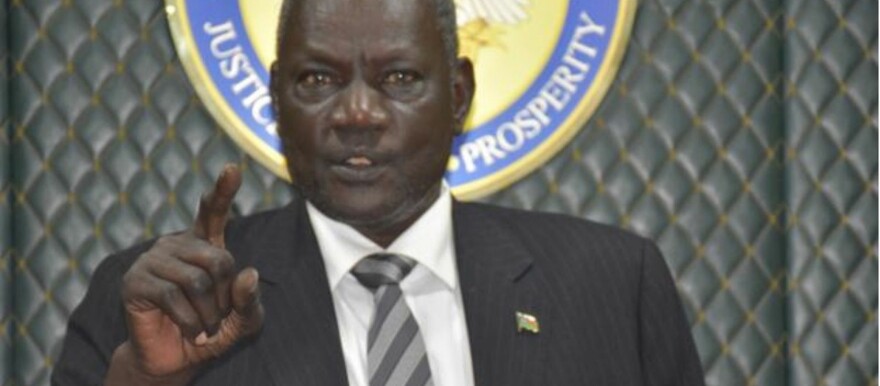South Sudan’s Minister of Information and Communication, Michael Makuei Lueth, said the government arbitrated the crisis between the leaders of the Episcopal Church of South Sudan (ECSS) in Bor, Jonglei State, to save lives.
Makuei made the remarks at a press conference on Tuesday in Juba while reacting to a statement by the Primate of the ECSS, Archbishop Justin Badi Arama, last week in which the latter castigated government officials for getting involved in the church’s administrative matters. Badi also decried the lack of government protection for the church, clergy, and faithful.
The ECSS has suffered internal contradictions and conflict in Bor and Juba since Badi defrocked Bishop Reuben Akurdit Ngong in August 2020, accusing him of canonical disobedience. Akurdit tried unproductively to get restored by the secular courts, which referred the matter back to the church.
The Rt. Rev. Moses Anur Ayom replaced Akurdit as the Archbishop of the Internal Province of Jonglei and Bishop of Bor, and ever since the followers of the two men have been clashing.
On 2 August, state authorities shut down Langbar Episcopal Church in Bor following clashes between the rival groups over the ownership of the church. A bishop and 25 Christians were arrested and detained because of the melee.
Addressing the press on Tuesday, Minister Makuei justified the government’s intervention,.
“Now he (Badi) accuses us the people of the community and the politicians and tells us to keep away from the church. Where does the church have people? The people are the church and the community is the church. Without community, there is no church. Even him the primate, when he retires, he will go back to the community,” he charged. “We are from the community and we are from the church. You first belong to the community before you go to the church and when you finish the work in the church you will go back to your community. If anything happens in Bor and people are shot dead, will the church claim them?”
“This is what we are after, we want peace, we want these children who are highly agitated and turned into fanatics not to kill themselves,” Makuei added.
He refuted claims that politicians stoked the violence that happened at St. Peter Parish in the Langbar suburb of Bor town earlier in the month and fan the flames of the unrelenting crisis in the ECSS in Bor.
“The primate now accuses us and says that we keep away from the church,” the minister said. “If we tell these boys to keep away from the church and we move away from them, we take them to the community, to whom will they be preaching in the church because these are our people, these are people of South Sudan.”
According to Makuei, President Salva Kiir’s intercession in the ECSS conflict in Bor was aimed at resolving the misunderstanding which has consumed the church since 2020.
“He (Primate Badi) is even charging the president of having interfered in the affairs of the church. How will the president be interfering in the affairs of the church and he (Badi) is the one who went to him?” he said. “Even if he (Badi) were not to go to the president, the president has that obligation to protect his people, to protect the people of South Sudan in case of any insecurity. So, the president has the right.”
In June, President Kiir mediated between the differing ECSS leaders and it was agreed that Bishop Akurdit pen an apology to Primate Badi. However, the former only agreed to apologize on condition that his defrocking is reversed.
Akurdits spokesperson, Philip Maluak, at the time, told Radio Tamazuj that Akurdit agreed to apologize on condition that he is reinstated and that the dioceses (Makuach, Anyidi, and Cuei-Kee) and bishops he created are confirmed.
Dr. Badi, on his part, at the time said he accepted Akurdit’s apology and that he was ready for reconciliation.
He however with circumspection said that whatever was resolved by the president and his mediation team had to be verified and conform to the church’s constitution, laws, and canons.




